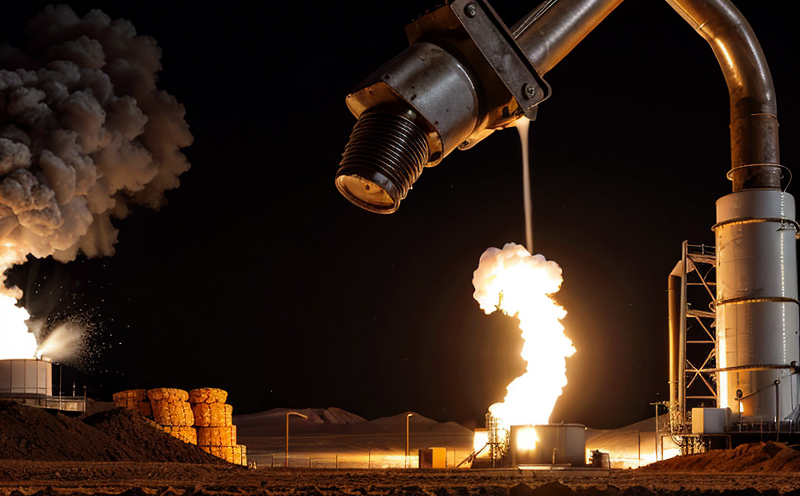ISO 8754 Sulfur Determination in Fuels for Export Compliance
The ISO 8754 standard is a critical tool for ensuring that fuels meet international sulfur content requirements, particularly important for exports where stringent regulations apply. This service plays a pivotal role in the global fuel trade by facilitating compliance with environmental protection standards such as MARPOL Annex VI and U.S. Environmental Protection Agency (EPA) regulations.
ISO 8754 specifies gravimetric and colorimetric methods for determining sulfur content in fuels, providing accurate measurement of the sulfur content down to very low levels. This is essential for ensuring that exported fuels meet the stringent limits imposed by international shipping standards. The process involves a series of steps: sample collection, digestion, and finally, the determination of sulfur content.
The gravimetric method typically uses an oxygen flask combustion technique where fuel samples are combusted in the presence of oxygen to convert all organic sulfur compounds into sulfur dioxide (SO₂). The resulting gaseous SO₂ is then absorbed by a solution containing thiosulfate ions, which form sodium sulfite. This process allows for precise measurement through gravimetric analysis.
Colorimetric methods involve converting the sulfur in the fuel to a colored compound that can be measured spectrophotometrically. These methods are often used when high precision and low detection limits are required, as they allow for very accurate quantification of trace amounts of sulfur.
The importance of this service cannot be overstated, especially given the environmental impact of sulfur emissions from fuel combustion. Compliance with these standards not only helps to protect the environment but also ensures fair competition in the global market. Non-compliance can result in significant penalties and damage to a company's reputation.
In addition to ensuring compliance, this service also supports R&D efforts by providing reliable data on fuel sulfur content. This information is crucial for refining processes and developing new formulations that meet or exceed regulatory requirements. For quality managers and procurement officers, accurate sulfur determination ensures the reliability of purchased fuels while maintaining consistency with global standards.
The laboratory adheres strictly to ISO 8754 guidelines, ensuring consistent and reliable results. Our team of experts uses state-of-the-art equipment to perform these analyses, providing clients with confidence in the quality of their exported fuels. With our comprehensive testing capabilities, we offer a full suite of services aimed at supporting your compliance efforts.
Applied Standards
The ISO 8754 standard is widely recognized and applied globally for determining sulfur content in various types of fuel. This service strictly adheres to the guidelines set forth by this international standard, ensuring that all tests are conducted under the most rigorous conditions.
The standard specifies two primary methods: gravimetric (ISO 8754-1) and colorimetric (ISO 8754-2). Each method has its own advantages depending on the specific requirements of the testing. The gravimetric method is preferred for its simplicity and accuracy in measuring sulfur content, while the colorimetric method offers a more precise measurement of trace amounts of sulfur.
Our laboratory uses both methods to provide clients with comprehensive testing options. This dual approach ensures that we can meet all client needs, whether they require high precision or simply need reliable results for regulatory compliance.
Benefits
The benefits of adhering to ISO 8754 standards are numerous and far-reaching. By ensuring accurate sulfur content measurement in exported fuels, this service helps clients meet stringent international regulations, thereby avoiding potential fines and penalties associated with non-compliance.
In addition to regulatory compliance, this service also supports the company's broader business objectives by enhancing its reputation for reliability and quality. This is particularly important in a competitive global market where trust in suppliers is paramount.
For R&D teams, accurate sulfur content data can provide valuable insights into fuel performance and help identify areas for improvement. This information can be used to develop new formulations that meet or exceed regulatory requirements while also improving the overall quality of the fuel.
The service also supports procurement efforts by ensuring that purchased fuels meet the required specifications. This helps maintain consistency in fuel quality across batches, reducing variability and potential issues downstream in the supply chain.
Industry Applications
This service finds application in a wide range of industries where sulfur content in fuels is critical for compliance with international regulations. Key sectors include:
- Maritime Transport - Ensuring compliance with MARPOL Annex VI and other global shipping standards.
- Aerospace Industry - Meeting regulatory requirements for aircraft fuel quality, particularly important for long-haul flights.
- Retail Fuel Stations - Maintaining consistent fuel quality across different locations to ensure reliability and customer satisfaction.
By leveraging our ISO 8754 testing service, these industries can confidently meet their regulatory obligations while also improving the overall quality of fuels they supply or use internally.





